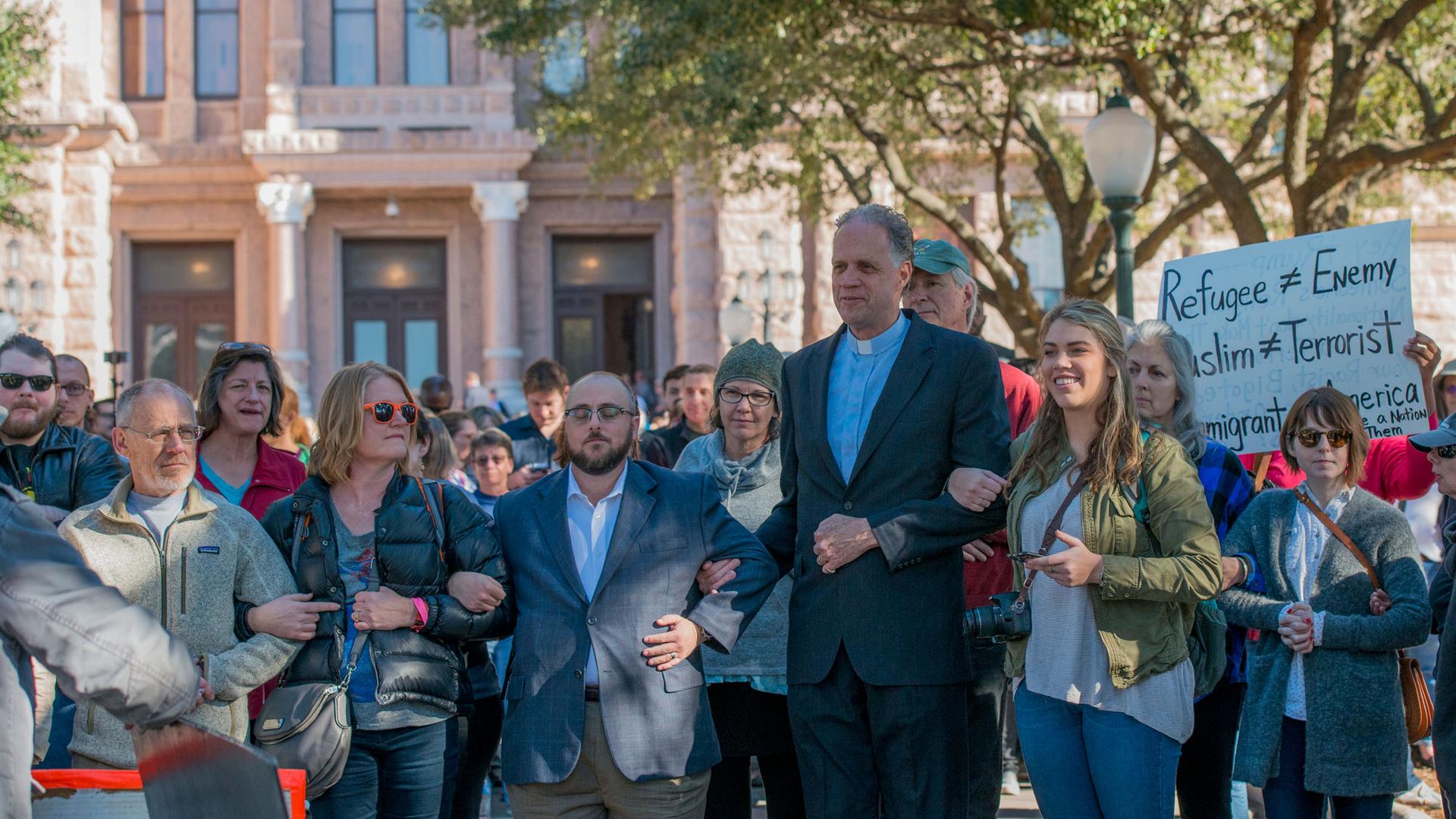Volunteers showed up by the hundreds at "Texas Muslim Capitol Day" in Austin on Tuesday and they locked arms to prevent anti-Muslim protesters from approaching the rally. January 31, 2017
These are anxious times for Muslims in America, and that goes for folks from the large population of Muslims who call Texas home.
Recent developments in the Lone Star State include a mysterious fire that gutted a mosque in the Gulf Coast city of Victoria.
Several days before that incident, a Texas state representative sent out several hundred letters to Islamic centers across the state, questioning the patriotism of Muslim leaders.
The election of Donald Trump and last week’s travel ban for people from seven Muslim-majority nations has also been a cause for concern.
It all added up to more anxiety ahead of this week’s “Texas Muslim Capitol Day,” an event held every two years when the state legislature is in session. Muslim Texans from different parts of the state gather at the statehouse in Austin to hold a rally and meet with politicians in the state legislature.
Organizers had expected there might be some trouble, so they put the word out. “Looking for a way to support your Muslim neighbors?” read an email that called for volunteers to come down to the capitol building on Tuesday morning to help keep the peace.
Hundreds of them showed up.
The volunteers locked arms and formed a wide, semi-circular human chain, several rows deep that surrounded the south steps of the capitol where the rally took place.
But, in the end, there wasn’t much trouble.
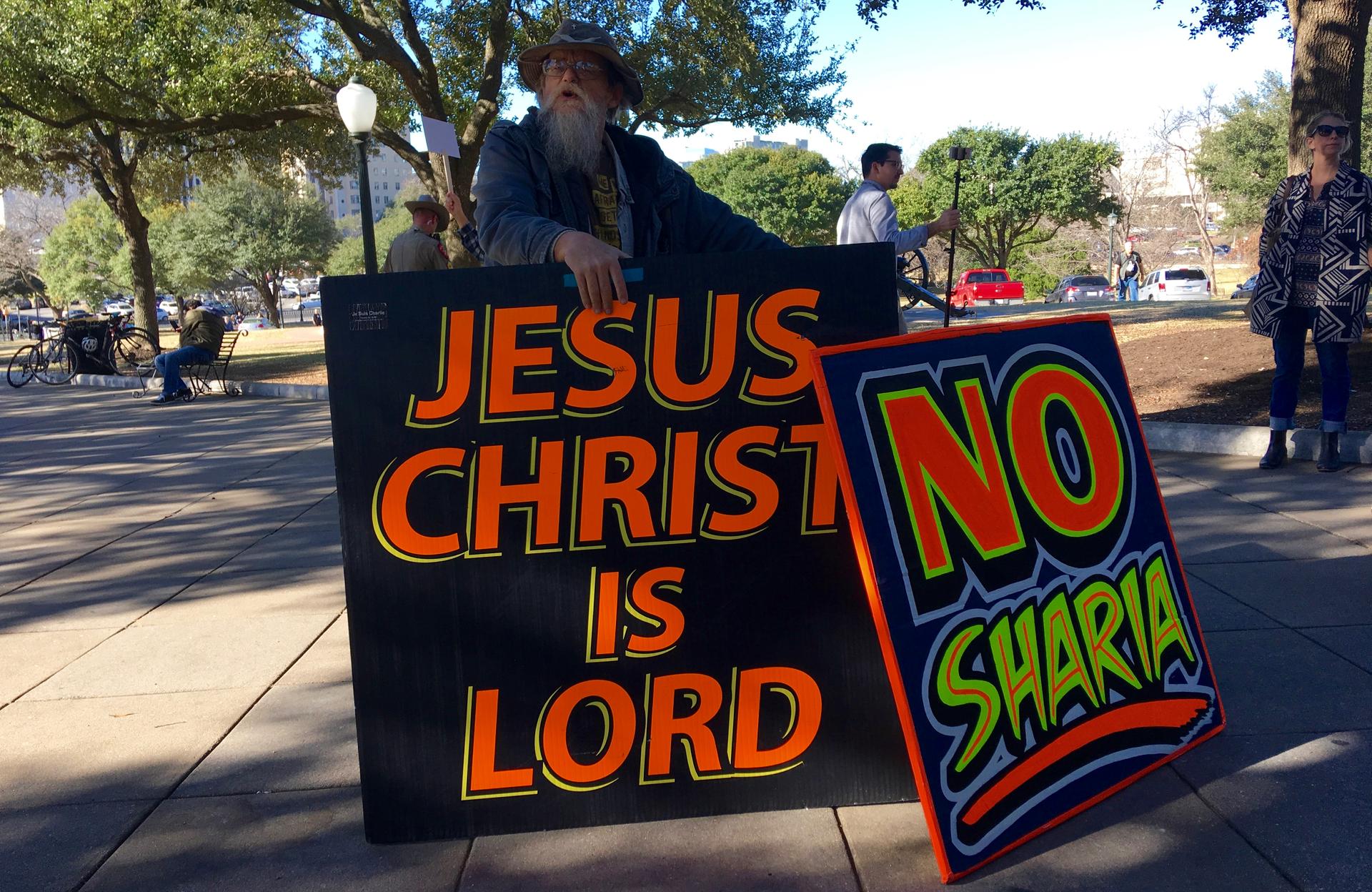
A single, but highly vocal, anti-Muslim protester brought big signs that read, “No Sharia,” and “Jesus Christ is Lord,” and a third sign that was displayed upside down.
The volunteers broke into applause to drown out the protester’s steady stream of insults about Islam, the Prophet Muhammad, and the people who’d come out wearing T-shirts that said, “I stand with my Muslim neighbors.”
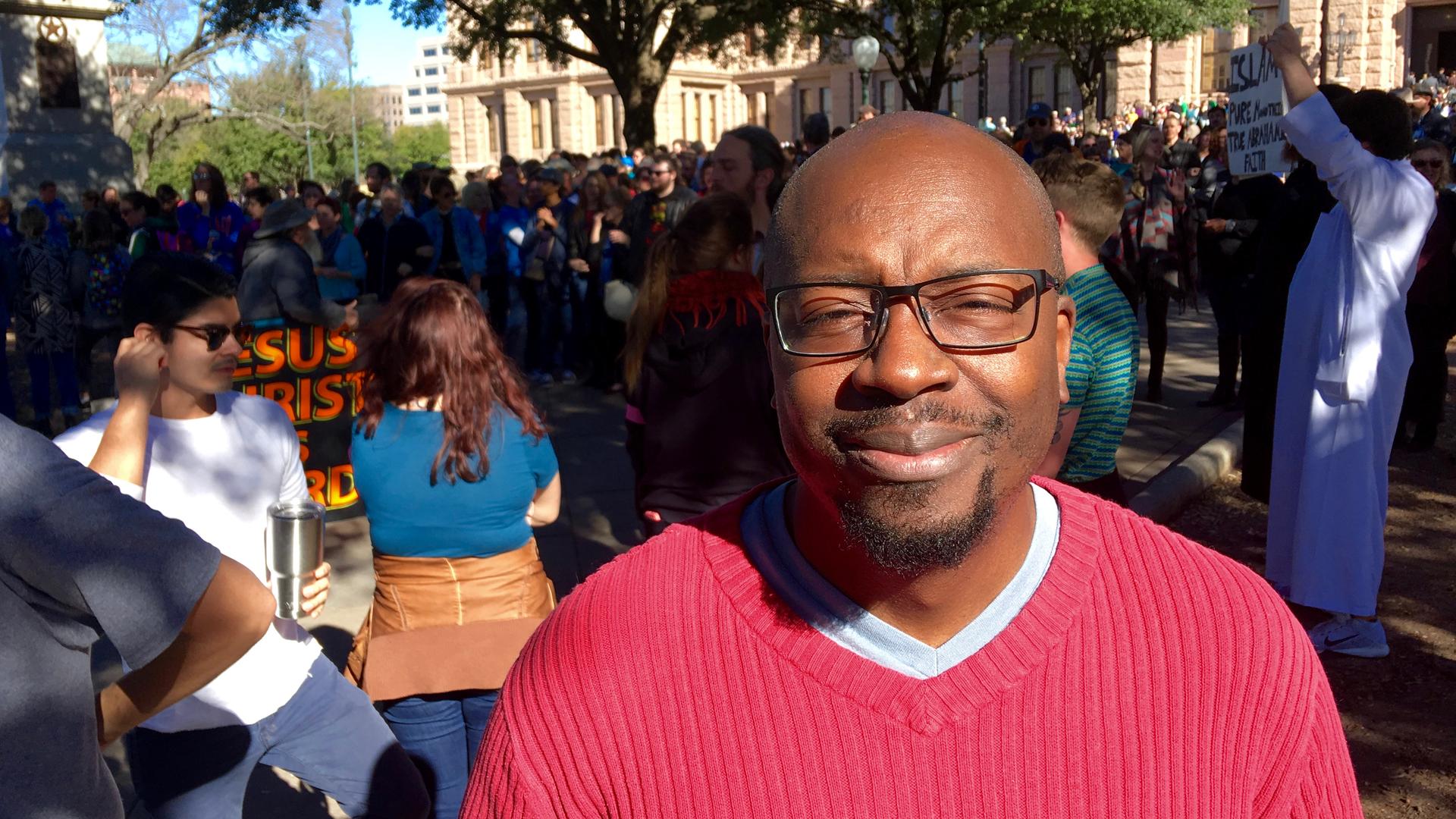
At one point, 43-year-old visual effects artist Chilimbwe Washington of Austin tried to engage the protester in a calm conversation. But it didn’t go very well.
“You’re useful idiots for the Muslims and they know it,” the protester hollered. “Muslim is evil through and through! Enough said!”
“My father and my grandfather were Christian preachers,” Washington said calmly. “Have you heard of the Crusades? Were we righteous then?”
Afterward, Washington told me it was important to him that he attended Tuesday’s rally.
“Fear is something that I do not abide,” Washington said. “It’s my job to stay here and fight the sick mentality of hatred. Period. I mean, there’s no alternative for me.”
One of the leaders of the rally was Mohamed-Umer Esmail, imam at the Nueces Mosque in Austin, who welcomed every group of attendees he could think of, from Muslims, Christians and Jews, to atheists and people from the LGBT community.
“I am humbled at your support, thank you. I will never ever forget this day for the rest of my life,” Esmail told the crowd.
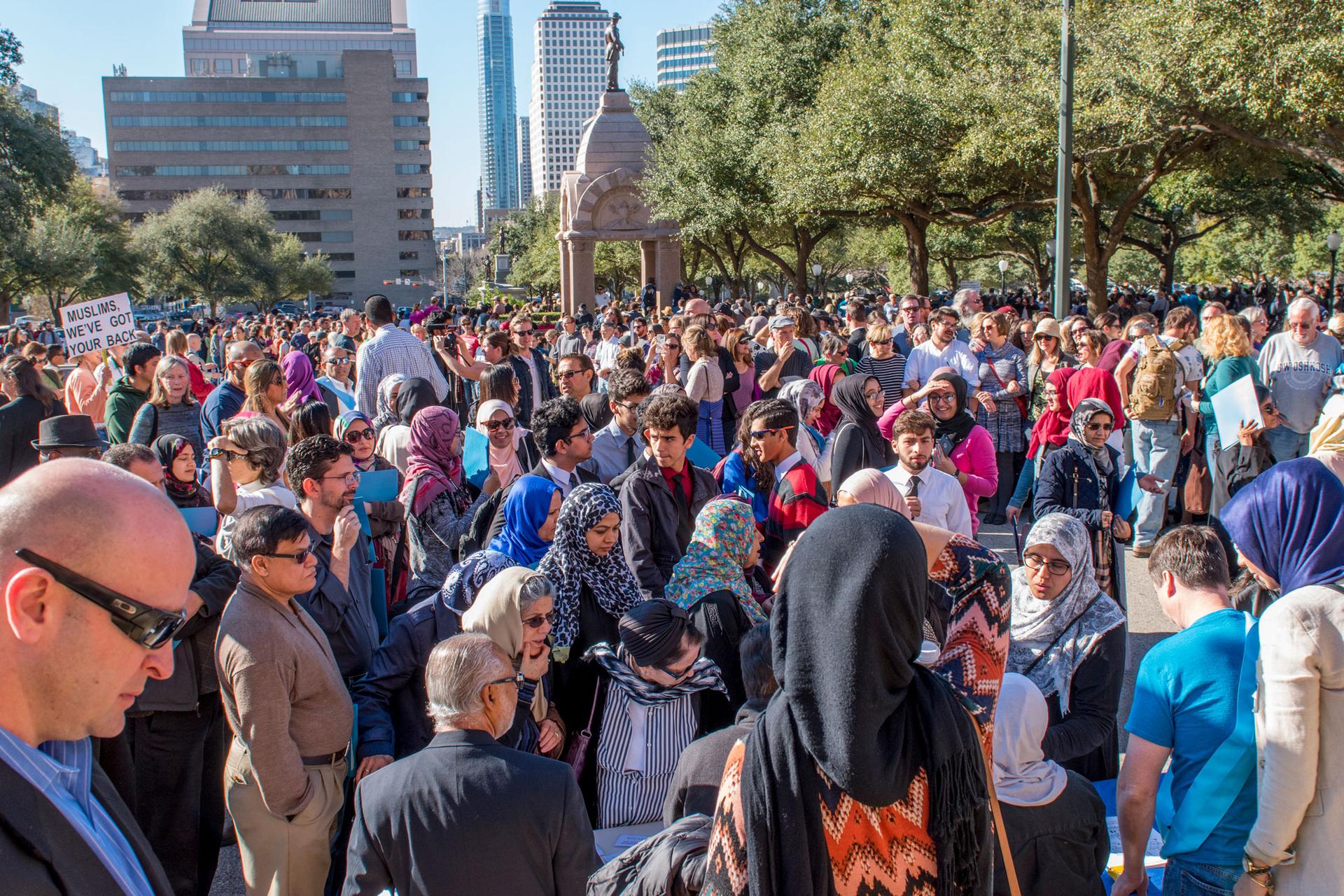
Later in the day, the imam told me that people came out to the capitol in larger numbers than ever for one reason above all.
“This is what America is all about. The support came because they were exemplifying true American values. This is something all of our representatives should look at,” Esmail said.
That might be the main purpose of this event, which has been held every year since 2003. Muslims from different parts of Texas take buses to the statehouse and they spend the afternoon meeting with their local state representatives.
Esmail says one thing that’s making those conversations between Texas Muslims and their state lawmakers more difficult is the extreme rhetoric from American politicians about terrorism and Sharia law — from the White House on down.
“It’s the fear that’s being created in the hearts of people,” Esmail says.
“A lot of people are asking that, ‘You guys are trying to impose the Sharia.’ And I don’t know how anybody can ever think that we want Sharia to be the law of the country. It’s so far-fetched, that it makes me laugh.”
But one person who is not laughing is Texas state representative Kyle Biedermann. Biedermann is a Republican who describes himself as a “rock solid conservative.”
Last month, Beidermann’s office sent letters to hundreds of Muslim leaders across Texas, asking them to respond to questions about Islamic extremism. People from the Muslim community throughout the state saw the questionnaire as harassment.
But the Texas house speaker, Joe Straus, who is also a Republican, issued a statement saying that “it is wrong and offensive to single out any group based on their religion.”
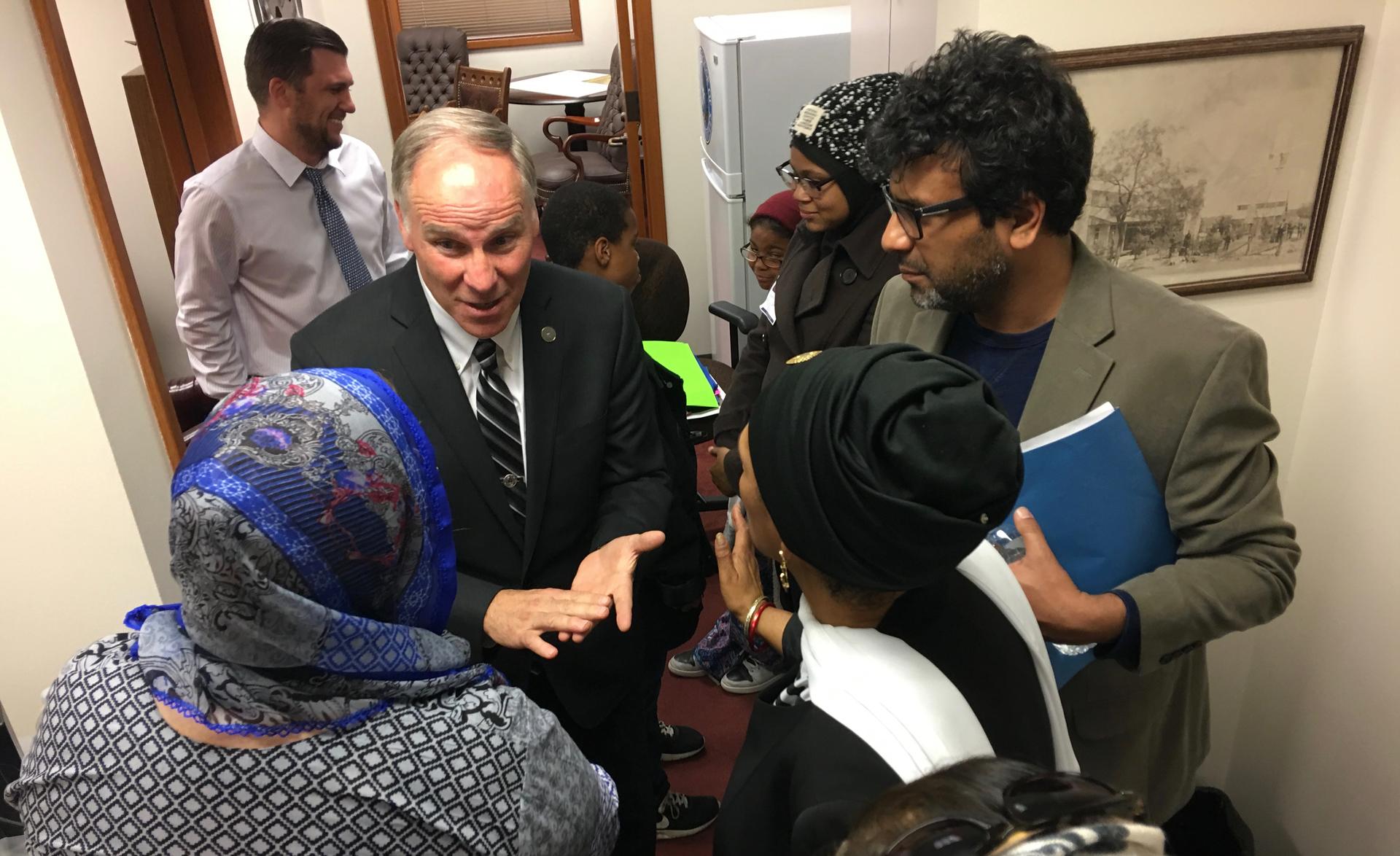
On Tuesday afternoon, a group of a dozen or so Texas Muslims left the rally and went to Biedermann’s office in the statehouse to express their disapproval about several things directly.
Biedermann welcomed the group into his office and said he was happy to listen to their concern. The group of mostly women explained that Sharia is not something that represents a threat to US law, but rather that observant Muslims are required by Sharia to abide by the law of the land where they live.
“Our whole desire is women’s rights, civil rights, human rights, religious freedom, border security,” Biedermann said. “We’re asking for information. So, please send it to us and I will make sure I share it with the other legislators.”
When Biedermann urged the group to publicly condemn radical Islamic terrorism, borrowing a phrase often repeated by President Trump, several of the visitors chimed in together.
“If you would speak out,” Biedermann began.
“We do,” said at least three of the women present. They went on to say that the fight against extremism starts in the mosques, and that Muslims are often asked to condemn acts of violence committed in the name of their religion.
The meeting lasted a little over 10 minutes. It was tense, but cordial. When two of the Muslim women invited the lawmaker to visit one of their mosques, Biedermann sidestepped the invitation.
After the meeting, I asked Nikiya Natale how she thought it went. Natale is an attorney with the Council on American Islamic Relations, which organized the Muslim Day event at the capitol.
“I’m unsure,” Natale said. “He needs to better understand the Muslim community and possibly the threat of radical Islam in Texas too. I mean, of course, the Muslim community would love to work together with him. But at this point, we don’t know what to expect.”
In Texas, as in other parts of the US, religion and politics can certainly drive people apart, says Bee Moorhead of Texas Impact, an interfaith lobbying group in Austin that helped promote Tuesday’s event at the capitol.
But Moorhead says there’s another widely shared value among a majority of Texans from just about all faiths. And that is neighborliness.
“We tend to trust our neighbors and we tend to want to take care of our neighbors,” Moorhead told me.
“When you see legislators from one religion talking to constituents from another religion about policies that affect all religions, the core value that they’re sharing … [is] the value of being each other’s neighbor.”
And what do these major faith traditions agree on, Moorhead asked?
“Love God and love your neighbor,” she said.
An earlier version of this story stated that ‘Texas Muslim Capitol Day’ happens annually. The event takes place every other year, because the state legislature in Texas is in session for about five months, January through May, in each odd-numbered year.
We’d love to hear your thoughts on The World. Please take our 5-min. survey.
